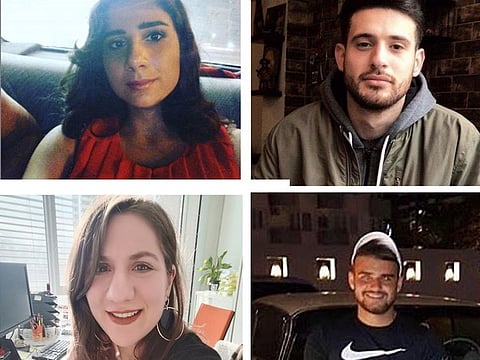COVID-19: Lebanese students stranded abroad rue delay in repatriation process
Problems that started with dollar transfer limitations get worse with COVID-19 outbreak

Beirut: Lebanese students abroad have been left in an uncertain situation amid unparalleled hardships that started with Lebanon’s monetary crisis before the coronavirus pandemic made it grimmer.
Expatriate students’ adversities started after the Lebanese uprising in October 2019 when the Central Bank limited dollar transfers abroad, making it difficult for parents to finance their children’s education.
The situation worsened when the value of the Lebanese pound plummeted from Lebanese pound 1,500 to more than 3,000 to a dollar.
In February-March, coronavirus became a global pandemic, bringing practically the entire worldwide to a standstill.
Since then, overseas Lebanese students made their plights public on news channels and social media networks, begging the Lebanese Cabinet to repatriate them as they were stuck abroad in the midst of lockdowns — penniless and in real danger of losing an academic year.
Rita Abi Rizk, a postgraduate student at Ilia State University, said life in Tbilisi had become tougher by the day, particularly because she was running out of cash amid the isolation.
No money
Voicing her concerns, she told Gulf News: “Students studying in Georgia rely on their parents to send them money. Most of our parents are daily wage earners. Due to the lockdown, economic and banking restrictions, our parents cannot wire us money. Many students have not paid their rents for April ... we are trying to survive on the very small amounts left on us.”
Rita, who might return to Beirut through Yerevan in next month, urged the Lebanese Cabinet to speed up the repatriation process in view of health, humanitarian and financial concerns.
Ali Hamdan, another student in Georgia, shared the same financial and health concerns and highlighted the fact that many students had withdrawn their tuition fees from the universities in order to be able to make ends meet.
'Cannot waste more time'
“Students couldn’t afford their monthly payments for rent and daily, basic needs. So they had to stop their studies and withdraw their tuition fees in order to be able to survive. We need to return to Lebanon very soon, to be with our families and pursue our courses online ...We cannot waste more time and lose our second semesters,” said Hamdan who urged the Lebanese Cabinet to send a plane to repatriate nearly 80 students currently stuck in Georgia.
Meanwhile, 22-year-old Mariam Yousef, who is studying petroleum engineering in Moscow, said the situation is getting worse and survival has become extremely difficult, while the Lebanese Embassy hasn’t been of much help.
“They claimed to be waiting for the Foreign Ministry’s response. I want to return home and be with my family during this uncommon outbreak. Looks like there will only be one trip to repatriate migrants and, as usual, priority will be given to those with ‘wasta’ [connections]. My parents couldn’t send me money and I’m late with a month’s rent,” said Mariam, who had serious concerns as to how she would be able to survive in a penniless state in Moscow, without any assistance from the embassy.
In September, 2019, Hassan Hadid had moved to Clermont-Ferrand in France to study. With Lebanon’s monetary crisis and the banking restrictions intensifying, it became hard for his parents to finance his education. Even then, he managed to pull through — until Covid-19 struck.
“My father hasn’t been working to be able to send me money. I can’t pay rent or keep financing my living. I have applied more than once to return [home], but haven’t been lucky,” 24-year-old Hadid told Gulf News.
Hoping to be on the next plane repatriating citizens, Hadid blamed Middle East airlines for fares as high as 1,200 euros (Dh4,783).
“That’s crazy ... Is it only possible for rich people to return?” exclaimed Hadid. France-based expat May Taha, a dynamic volunteer in the Lebanese Expatriate Students Association, revealed that Lebanon’s economic situation, banking limitations and the fluctuating dollar value have all combined to hit them hard, but they sill managed.
Offer of help
“The association and organisations assisted students find jobs to survive. Things turned seriously bad after the coronavirus outbreak as France went in complete lockdown and things in Lebanon weren’t any better either. Everything stopped even, university grant ... many couldn’t even buy food. We have organisations registered in France, in addition to WhatsApp and Facebook groups. Those associations collected donations and assisted students as much as possible,” said Taha in her capacity as the association’s spokesperson.
She and other Lebanese expats living in France have offered some help and the Lebanese Embassy is also trying to be helpful.
Mohammad F., studying in Ukraine, said pressure had been escalating since the beginning of this month and revealed that students were having their doors knocked by landlords seeking rents, even as universities were demanding tuition fees to keep students enrolled.
“Many students are looking for jobs to endure and others are subsisting on donations. The Lebanese Cabinet has got to find a quick way to repatriate us,” he said.
During the first repatriation drive arranged by the Lebanese Cabinet between March end and the first week of April, few thousands of stranded citizens were repatriated.







